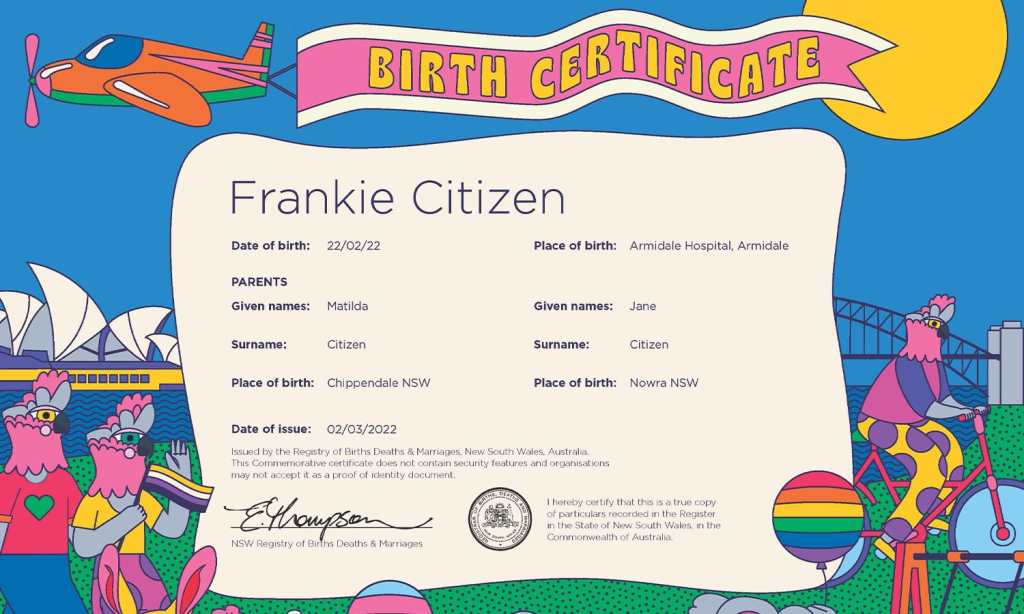The NSW Government has announced the release of birth certificates that remove the mention of sex or gender.
In a move that coincided with the state’s Mardi Gras celebration at the start of the month, the commemorative certificates can be ordered as part of a package – along with official, gendered birth certificates – to celebrate diversity.
However, the new certificates only picked up traction after One Nation MP Mark Latham made a big angry fuss about it and an anti-LGBTQI group sounded off in The Daily Telegraph.
To be clear, the certificates are not official. They are purely commemorative and designed to allow LGBTQIA+ families and allies to celebrate gender diversity in an inclusive fashion. In order to get one, you also need to apply for an official birth certificate, which records a baby’s sex at birth, and you can’t get a commemorative one alone.
The NSW Department of Births, Deaths, and Marriages worked with LGBTQIA+ empowerment charity the Rainbow Family Association to create the certificates, with Sydney artist Monica Higgins doing the design.
Higgins, who identifies as queer, used pride colours in the design to depict genderless native animals as rainbow families enjoying themselves among iconic Sydney landmarks.
“I’ve removed gender from the focus of the illustration to give our rainbow families the freedom to be seen as they wish to be,” Higgins said.
She also pledged $1 from the sale of each Rainbow commemorative birth certificate, which cost $41 each, to Twenty10 Gay and Lesbian Counselling Service NSW.
“It is so important to me that LGBTQIA+ youth feel safe, validated and understand that they are not alone and Twenty10 do an excellent job of making this happen,” Higgins said.
Predictably, this did not sit well with certain elements of society who, for some reason, need to have strong opinions on issues that don’t affect them.
“All this virtue signalling in the public sector ends up being a waste of time, a waste of money and for what?” Senator Latham said.
“It defies what most people would regard as the point of a birth certificate, to identify the individual, their date of birth and gender.”
Again, not an official birth certificate, Mark.
The anti-trans group Binary was also quoted, saying that this change was an imposition of “gender ideology.”
“This is another step in the appropriation of sex and it will cause harm and confusion for our children,” spokeswoman Kirralie Smith said.
Smith is a former Senate candidate for Cory Bernadi’s Australian Conservatives Party and fronted the group Binary when it was called Marriage Alliance, which fought to stop non-heterosexual people from getting married during the plebiscite.
Latham argued that the new certificates were a “waste of money,” all $6257 of the money spent in total, as only 12 people in the month since it was launched have applied for one.
According to the latest census data, at least 10,000 people recorded their gender as something other than male or female, which the ABS said showed 1,260 clear “intentional and valid sex/gender diverse responses”.
The ABS report that this is a minimum estimate and is “expected to have been substantially under-reported” during the 2016 census, the first to record gender diversity. Therefore, the use and demand for these types of certificates is likely to increase given the range of gender diversity in Australia.
These things are just a bit of fun. You can also get a commemorative birth certificate with your favourite NRL team’s branding, Indigenous artworks, or Peppa Pig. Latham and Binary are, notably, not calling that a waste of time and money.
In many states in Australia, including NSW, birth certificates already allow for the recording of sex as something other than male or female. Tasmania recently passed a law allowing gender-neutral birth certificates to be printed, joining other jurisdictions like New Zealand, India, Germany, and New York City in doing so.
Beyond trans issues, between 0.005 and 1.7% of people are born intersex, with their gender not readily recordable on a binary birth certificate.
Dr David Cox, chairman of the Law Commission of Western Australia’s review into the issue, put it best when he said:
“For the vast majority of the population it’s not going to make one iota of difference … it’s not going to affect the fabric of government, it’s not going to affect the fabric of society, it’s not doing anything really, but it’s going to make life a lot easier for a small group of people”.
Read more stories from The Latch and subscribe to our email newsletter.

